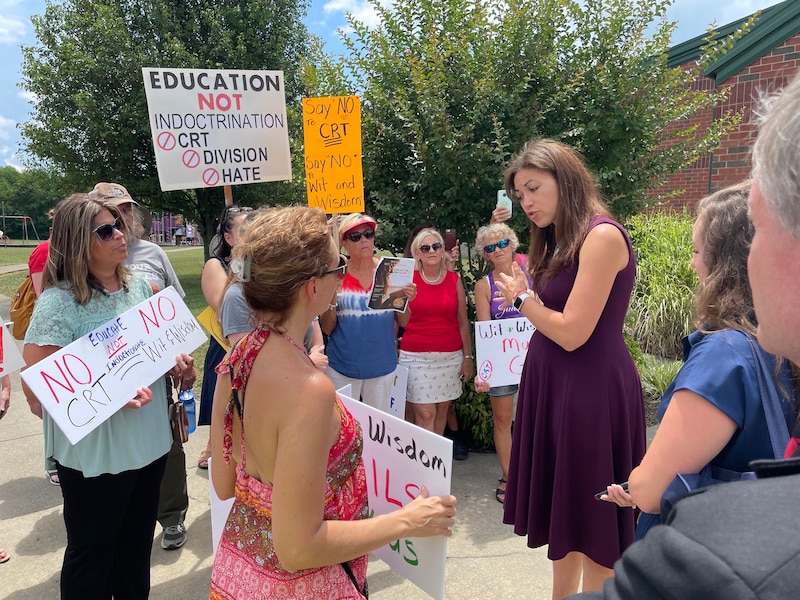Sign up for Chalkbeat’s free weekly newsletter to keep up with how education is changing across the U.S.
Former Tennessee Education Commissioner Penny Schwinn has been named to serve as deputy education secretary in the incoming Trump administration.
President-elect Donald Trump announced the pick in a post on Truth Social Friday evening. He described Schwinn as having a “strong record of delivering results for children and families.” He also misstated her name as Peggy Schwinn, rather than Penny.
Schwinn – who started her career as a Teach for America corps member in Baltimore, founded a charter school, and served in high-level administrative roles in several states and at the University of Florida – would bring extensive education experience to the role, in contrast with Trump’s education secretary pick, World Wrestling Entertainment co-founder Linda McMahon.
“Penny is a true conservative with a brilliant mind for education,” Tennessee Gov. Bill Lee wrote on the social media site X. “Tennessee benefited from her service & now our country will.”
Schwinn served at the helm of the Tennessee Department of Education during a pivotal time when the state overhauled its school funding formula and its approach to literacy instruction amid the disruptions of the COVID-19 pandemic.
Her tenure was also marked by controversy, with high turnover in the education department and a no-bid contract to a company charged with managing the state’s incoming pilot voucher program. State lawmakers frequently complained that she launched new initiatives without appropriate consultation.
Schwinn fell afoul of cultural conservatives who felt she did not do enough to ferret out progressive approaches to teaching race and history in the state’s schools. A proposal to use federal money to conduct “well-being checks” on Tennessee children not in school alarmed parents’ rights advocates.
The conservative Tennessee Star on Saturday highlighted her affiliation with members of the “Never Trump” movement. Even some of her more moderate critics expressed surprise at the appointment.
“If anybody looked into her background, they would say she was not a fit for this administration,” said JC Bowman, executive director of Professional Educators of Tennessee and a frequent critic of Schwinn during her time as state education chief. “So I didn’t see it coming. Whoever vetted her needs to be vetted.”
Throughout her career, Bowman told Chalkbeat, Schwinn “has been all up and down the ideological spectrum,” depending on who she was working for.
“I don’t dispute that she’s a hard worker,” he said. “Whatever agenda she’s given, she’ll put in the effort to do it.”
Trump staffing up education department he wants to abolish
There is significant uncertainty over the shape of education policy in the next Trump administration. As a candidate, Trump pledged to dismantle the U.S. Department of Education and to remove “woke ideologies” from American classrooms. His campaign portrayed teachers as “groomers” recruiting children to change their gender and opposed policies that promoted inclusion for transgender students.
But neither of his two leadership picks so far, McMahon and Schwinn, have track records as cultural conservatives. McMahon has spoken in favor of private school choice, apprenticeships, and better workforce education. Since leaving the Tennessee education department, Schwinn has continued to advocate for improving literacy instruction.
In an op-ed in The 74 this summer with Maryland State Superintendent of Schools Carey Wright, Schwinn advocated for the creation of a National Center for Advanced Development in Education at the Institute of Education Sciences, the research arm of the U.S. Department of Education.
Disseminating research and best practices is a major role of the federal department that Trump ostensibly wants to eliminate. Actually getting rid of the department would require an act of Congress, which seems unlikely. Since being elected, Trump has referred often to returning education to the states, which already control most aspects of education policy. Schwinn would bring the perspective of a state schools chief to her job.
Deputy and assistant secretaries of federal agencies can play a major role in shaping policy, particularly when the secretary, like McMahon, has limited experience. Observers are watching to see who Trump appoints to head civil rights enforcement within schools.
Schwinn’s tenure in Tennessee marked by victories, controversies
Schwinn joined the Lee administration in 2019 and served through 2023. At the time of her departure, she told Chalkbeat the pandemic represented her greatest challenge. Tennessee drew national praise for programs that targeted pandemic relief to students who suffered some of the worst setbacks.
“When we look at the last four and a half years and the pretty incredible challenges that we’ve faced in education across this country, I cannot think of a state that has shown more leadership than Tennessee,” she said at the time.
Schwinn’s career has been marked by a rapid rise since she started in Baltimore in 2004 with Teach for America, a program that places college graduates in high-needs schools and encourages its alums to pursue leadership roles in education. She later founded Capitol Collegiate Academy, a charter school in her hometown of Sacramento, California, where she still serves on the board of directors. Schwinn served briefly in leadership roles for Sacramento’s school district and Delaware’s department of education before becoming chief deputy commissioner of academics for Texas in 2016.

In Tennessee, she helped Lee deliver on a rewrite of the state’s 30-year-old education funding formula to let funding follow the student, and set aside more money for students with higher needs. She also shepherded several new initiatives, including a comprehensive plan to improve literacy, help students recover from pandemic learning loss, and expand grow-your-own teacher training programs.
But in her first nine months on the job, nearly a fifth of the education department’s employees left, mostly from resignations. She also frustrated lawmakers who said she rolled out initiatives and took administrative shortcuts without ample legislative input, review, or approval.
As Tennessee expanded its voucher program, Schwinn tapped a top aide with experience running similar programs in Florida.
Schwinn most recently served as vice president of the University of Florida, working with former Republican senator and university president Ben Sasse. Schwinn worked remotely from Tennessee in a new position connecting university programs and K-12 schools. After Sasse abruptly resigned his position in July 2024, Schwinn was not re-appointed.
Erica Meltzer is Chalkbeat’s national editor based in Colorado. Contact Erica at emeltzer@chalkbeat.org.
Marta Aldrich is a senior correspondent and covers the statehouse for Chalkbeat Tennessee. Contact her at maldrich@chalkbeat.org.






